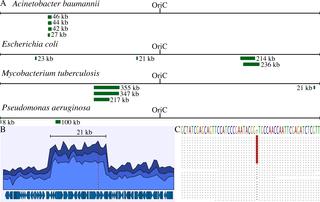PLOS Genetics ( IF 4.5 ) Pub Date : 2020-03-04 , DOI: 10.1371/journal.pgen.1008615 Gerrit Brandis 1 , Diarmaid Hughes 1

|
The relative linear order of most genes on bacterial chromosomes is not conserved over evolutionary timescales. One explanation is that selection is weak, allowing recombination to randomize gene order by genetic drift. However, most chromosomal rearrangements are deleterious to fitness. In contrast, we propose the hypothesis that rearrangements in gene order are more likely the result of selection during niche adaptation (SNAP). Partial chromosomal duplications occur very frequently by recombination between direct repeat sequences. Duplicated regions may contain tens to hundreds of genes and segregate quickly unless maintained by selection. Bacteria exposed to non-lethal selections (for example, a requirement to grow on a poor nutrient) can adapt by maintaining a duplication that includes a gene that improves relative fitness. Further improvements in fitness result from the loss or inactivation of non-selected genes within each copy of the duplication. When genes that are essential in single copy are lost from different copies of the duplication, segregation is prevented even if the original selection is lifted. Functional gene loss continues until a new genetic equilibrium is reached. The outcome is a rearranged gene order. Mathematical modelling shows that this process of positive selection to adapt to a new niche can rapidly drive rearrangements in gene order to fixation. Signature features (duplication formation and divergence) of the SNAP model were identified in natural isolates from multiple species showing that the initial two steps in the SNAP process can occur with a remarkably high frequency. Further bioinformatic and experimental analyses are required to test if and to which extend the SNAP process acts on bacterial genomes.
中文翻译:

SNAP假说:在利基适应过程中,阳性选择可能会导致染色体重排。
在进化的时间尺度上,细菌染色体上大多数基因的相对线性顺序并不保守。一种解释是选择很弱,允许重组通过遗传漂移使基因顺序随机化。但是,大多数染色体重排对适应性有害。相反,我们提出了这样的假说,即基因顺序的重排更有可能是利基适应(SNAP)期间选择的结果。通过直接重复序列之间的重组,非常频繁地发生部分染色体重复。重复的区域可能包含数十到数百个基因,并且除非通过选择得以维持,否则它们会迅速分离。暴露于非致死性选择(例如,需要在营养不良的条件下生长)的细菌可以通过维持重复进行适应,该重复包括提高相对适应性的基因。适应性的进一步提高是由于重复的每个副本中未选择的基因的丢失或失活。当重复副本的不同副本丢失了单个副本中必不可少的基因时,即使取消了原始选择,也可以防止分离。功能基因的丧失一直持续到达到新的遗传平衡为止。结果是基因序列重新排列。数学建模表明,这种积极选择以适应新生态位的过程可以迅速推动基因顺序的重新排列以固定。在来自多种物种的自然分离物中鉴定出SNAP模型的特征(重复形成和趋异),表明SNAP过程的最初两个步骤可能以很高的频率发生。



























 京公网安备 11010802027423号
京公网安备 11010802027423号